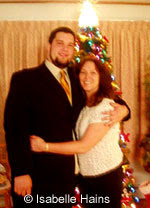 |
| Ana and Javier Acevedo on his 17th birthday, December 30, 2007. |
 |
| Isabelle and Daniel Hains, Christmas 2007, the night of the Bathurst High School Christmas prom. |
(Check out our RECOMMENDATIONS to the Coroners Jury)
Knowing how flawed the process is, we don't have very high expectations of this Inquest and we can't help but believe that it is doomed to fail from the very beginning.
Here are just a few of the problems we see with the Coroners Inquest process:
1. We don't know who the witnesses are because the Coroner won't tell us. It's a David and Goliath situation, where the Coroner and Crown Prosecutor know everything and we know nothing about who the witnesses are, what kind of evidence may be presented or even what the evidence is to start with.
2. It is an uneven playing field, balanced in favour of the government bureaucrats, administrators and employees whom we want to ask questions of at the Inquest. They have tax-payer funded lawyers representing them, coaching them on what to say and how to say it. We have nothing but ourselves and our own wherewithal to rely upon and if we want legal help, we have to pay for it ourselves.
3. We don't have "legal standing", so we can't have a lawyer represent us as "interested parties" whose sons were killed, to ask questions and cross examine witnesses as well as represent our interest at the Inquest. We are just ordinary people who have no formal educational background in the law. This is a complex, legal process that requires insider knowledge of government regulations, policies and Acts, the bureacracy and administrative practice. We are out-manouevered at every corner and can barely keep up with even the most basic understanding of the law. Without legal standing, we are at an extreme disadvantage with little or no confidence that the questions we want to ask will even be heard by witnesses - much less the jury - at the Inquest.
4. The Coroner has information we do not have, for example, we had to request the RCMP Reconstruction Report of July 28, 2008 and it took FOUR months before we received it which is completely unacceptable. We still don't have the RCMP Report of November 12, 2008, and had to request it under Access to Information. There is no telling when we'll get that report, but surely it will be long after this Inquest is over. Meantime, the Coroner had both reports in his possession a long time before we ever got it. The Coroner had the maintenance records, but we had to request the maintenance records from the Insurance Company and only received the invoices, not the check list. So we don't know what was checked when the mechanic (name unknown to us) at Hatheway Ford in Bathurst, did the Motor Vehicle Inspection on November 2, 2007, after failing it three days before, on October 29, 2007... This is just one thing among many that we would never have known had we not demanded the maintenance records.
5. Because we don't know who the witnesses are, we had to brace ourselves for the possibility that any one of a number of witnesses might be approached and had to come up with questions for every one of them. This took weeks of preparation and research, on top of the hundreds and hundreds of hours of research we had to do to become familiar with the Coroners Act, the Education Act, its regulations and policies, as well as the Motor Vehicle Act its regulations and policies. We had to do all the research ourselves, with no help or guidance whatsoever from anyone in the Coroners Office or the Department of Public Safety. In fact, when we asked last week a very simple question about the type of contract that Bathurst Van Inc. had with Bathurst High School, the Coroner refused to tell us. A simple yes or no would have saved us from a wild goose chase but he would not tell us so we had to guess what kind of a contract it was and we may be wrong, which means we may have wasted hours and hours of valuable time in these last two weeks chasing leads. At times it seemed like an impossible task. There were dozens of late nights, early mornings and long days reading the regulations, policies and immersing ourselves in the legal gobbledygook of the Department of Education and Motor Vehicle Act. And for what? Our questions may never make it past the Coroner.
4. The recommendations are not binding so even if the jury makes recommendations that we want, for example, Class 2 drivers (see our Tentative List of Recommendations for the Coroners Jury here), the Coroners Act has no means of enforcing the recommendations and therefore, they could just sit on a pile in someone's desk in Fredericton, as have all the other recommendations of Coroners' Inquest that have come before. In the Inquest into the Sussex crash, for example, the Jury recommended there be a public awareness campaign to educate drivers on the dangers of driving while tired. Did anything ever come of it?
5. We believe that because of the problems listed above, this Inquest is doomed to fail. It is proof that we need a new Coroners Act that brings death investigations into the 21st century, as has been called for by the Canadian Bar Association, New Brunswick Branch for more than six years!





